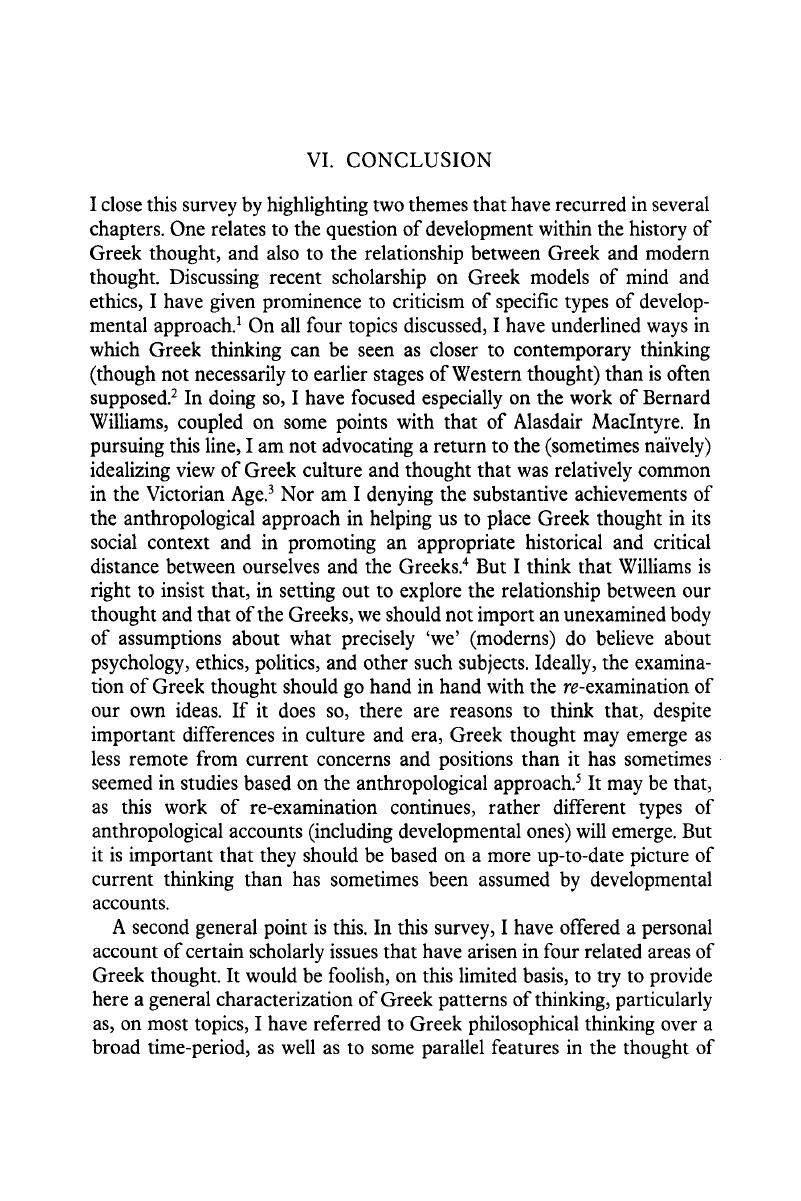No CrossRef data available.
Article contents
VI. Conclusion
Published online by Cambridge University Press: 05 February 2016
Abstract

- Type
- Editorial
- Information
- Copyright
- Copyright © The Classical Association 1995
References
Notes
1. See Ch. II, text to nn. 7-15; Ch. III, text to nn. 10-30.
2. See Ch. IV, text to nn. 7-8; Ch. V, text to nn. 15, 102; also refs. in n. 1 above. For some (brief) suggestions why Greek thought may be closer to contemporary thought than to that of some earlier periods of Western history, see Gill, C., Personality in Greek Epic, Tragedy, and Philosophy: The Self in Dialogue (Oxford, 1996), 6 Google Scholar. 7, text to nn. 247-54.
3. See e.g. Jenkyns, R., The Victorians and Ancient Greece (Oxford, 1980), esp. chs. 5 Google Scholar, 9, 10.
4. A further relevant modern discipline is that of ‘reception-theory’, which studies the interplay between text and audience (including audiences in different cultural contexts): see e.g. Holub, R.C., Reception Theory: A Critical Introduction (London, 1984)Google Scholar; Martindale, C., Redeeming the Text: Latin Poetry and the Hermeneutics of Reception (Cambridge, 1992)Google Scholar.
5. See further Williams, B., Shame and Necessity (Berkeley, 1993), ch. 1 Google Scholar.
6. Personality (full ref in n. 2 above), esp. Introd., and 6. 7; see also Ch. III above, text to nn. 36-8.
7. See esp. Ch. II, text to nn. 10-17, 27-8, 32-4.
8. See esp. Ch. III, text to nn. 24-30, 38; Ch. IV, passim. This point applies both to the kind of ‘objective-individualism’ associated with Kant (on which, see Ch. III, text to nn. 5-6) and the more radical ‘subjective-individualism’ associated with Nietzsche and Sartre, see further Gill, Personality, esp. Introd. and 6.7; also refs. in Ch. IV, nn. 2, 92.
9. Examples of thinkers adopting a ‘subjective-individualistic’ attitude to the determination of moral norms include, again, Nietzsche and Sartre (refs. in n. 8 above); see further (esp. on the relevance of such ideas to the interpretation of Homer’s Achilles), Gill, Personality, 2.3,5. For one version of a modern theory based on the idea that truth is ‘intersubjective’, see Davidson, D., Inquiries into Truth and Interpretation (Oxford, 1984)Google Scholar. On the contrast between Davidson and Plato in this respect, see Scaltsas, T., ‘Socratic Moral Realism: An Alternative Justification’, OSAP 1 (1989), 129-50Google Scholar.
10. See Ch. III, text to n. 38, also section 4; Ch. IV, text to nn. 10-11, 50-2, 57-62, 79-83, 88-100. See further Gill, Personality, 4.7, 5.7. For related questions about what should count as a ‘reasonable’ emotional response, see Ch. II, text to nn. 19-25, 29-34, 37-40.
11. See esp. Ch. V, nn. 59, 101.
12. Some related questions are explored in C. Gill, ‘Afterword: Dialectic and the Dialogue Form in Late Plato’, in C. Gill and M. M. McCabe, edd., Form and Argument in Late Plato (Oxford, forthcoming).


